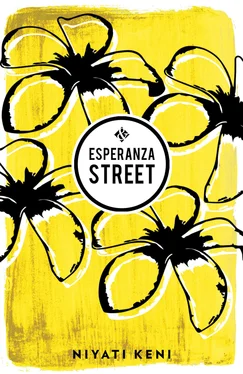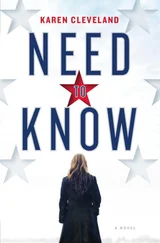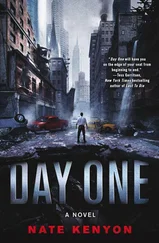‘Hard not to tell a thing like that to your brother when he’s asking,’ I said.
Uncle Bee shook his head; I was missing the point. ‘For some, money beats blood. They filed the application in February.’
I took this in slowly; it was hard to keep a little secret in Esperanza — a place where everyone knew who was more interested in their brother’s wife than their own, or who’d lied about their son’s school grades, or sold their neighbour’s dog — so to keep a thing like that quiet for months took some cunning. ‘Just after the Pope arrived,’ Uncle Bee said. ‘I guess they figured it would go unnoticed with all the excitement.’ I thought back to the Pope’s visit. Even in Aunt Mary’s house it seemed like the TV had never been switched off. ‘That boy Rico,’ Uncle Bee said. ‘Friend of yours?’ I shook my head. ‘Good. The kind of boy your mother used to call bulok .’ Bulok, rotten. She’d used that word often, for people she’d wanted me to stay away from.
Rico was my age but he’d dropped out of school a long time ago, so I saw him only occasionally, hanging out with his barkada , his gang: street-corner boys. They called their gang the Barracudas. The Barracuda barkada ; I guess somebody thought it was funny. It was no secret that Rico ran errands for Eddie Casama, which was as close, I reckoned, as he was ever going to get to real wealth. The rest of the time he and his boys made it their business to keep order in the barrio. In their own way, Rico’s family were as well known in the neighbourhood as Aunt Mary’s; if trouble broke out, it was widely assumed they knew more about it than most. Rico’s brother, Caylo, ran some pool tables, pinball and mah-jong in their yard. His cousin Rolly — after the bodybuilder Roland Dantes; I never knew his real name — ran a gym and Rico and his boys worked out there for free after closing time. In front of the store this afternoon, Rico had left his shirt wide open and anyone could see the working-out was paying off. Rico’s association with Eddie Casama had given him a kind of surly confidence. ‘Been strutting round like a prizefighter for weeks now,’ Uncle Bee said. ‘Like he knows something we don’t.’
‘I could ask Aunt Mary if she knows any more,’ I said, dropping the pitch of my voice to match his. I wouldn’t ask her, of course. I’d ask America instead and she’d probably just tell me off, like she always did, for being inquisitive.
‘Naw. You keep it close to you just for now, ok?’
‘Sure,’ but I was disappointed, a kid again.
‘Levi’s going up there this week to check the facts.’ He nodded uptown. ‘Maybe it’s nothing, eh?’ But he said it too carefully.
‘I hear anything, I’ll let you know.’
Uncle Bee smiled. ‘Ok, tough guy,’ he said.
He told me to wait and called to Suelita to wrap a couple of biscuits for me. After a minute we heard her knock on the counter to let us know they were ready. I stood up and reached out to shake his hand. He smiled at me again, raising his eyebrows when Suelita rapped, more loudly, a second time. He shook my hand, placing his other hand on my shoulder. It felt affectionate, easy, the kind of thing a father would do when his son might feel too old to be embraced.
At the hatch, Suelita held the parcel out to me without so much as a glance in my direction, continuing to stare down at the newsprint clippings spread over the counter. She’d knotted her hair back, secured it with an array of pencils. She tapped the handle of her scissors against her lower lip with her other hand, pouting slightly as she concentrated. I took the parcel and her hand folded in again like a makahiya leaf touched by rain. I stood there a little too long after taking the biscuits, imagining unfolding the newspaper to find a message from her, decoded slowly from the words she’d cut away — nothing obvious or sentimental, but something that would make me feel like an accomplice. Of course I knew the paper would contain no such thing, but I also knew I’d check anyway and consider keeping the paper, if only because she’d thought to press the top of the parcel into a handle. Then, for no reason, I pictured her handing a secret message to Rico instead and I flushed. She chose that moment to look at me, and gave me a questioning look: why are you still here?
I turned to go, stuffing the biscuits self-consciously into my mouth like a child. I crumpled the wrapper and pushed it into my pocket, to keep for the boarding house trash can, Aunt Mary’s voice in my head reminding me how uncouth it was to drop litter. I thought I caught Suelita’s smile as I started off but when I looked back she’d turned away again and was frowning down at her newsprint words, the luckiest scissors in the world tapping her plump lower lip.
Hen-Coops and Fish Baskets
The curandero’s alley split in two as it moved away from Esperanza Street. To the right, it widened and finally grew a sidewalk before leading to the basilica, the Chinese shops and restaurants and, eventually, the expensive apartment blocks higher on the hill. To the left, the alley led into the heart of Greenhills, so called by the inhabitants, though it was the colour of dirt and was flat, in mockery of the circumstances in which they lived: in Manila, Greenhills was where the rich lived; in Puerto it was a slum. If one continued walking through Greenhills in the direction of the sea, one came to Colon Market, quiet only at night, its stench declaring its presence long before and after its boundaries.
At the spot where the alley split stood the Espiritista chapel. Uncle Bee’s grandmother had established the chapel in the 1920s. The congregation had grown steadily since then but the chapel, hemmed in by wooden double storeys, had stayed the same size. To accommodate everyone, the rough wooden pews had been moved outside to line the courtyard in front of the chapel and the services were now all conducted standing. Even after mass, when the worshippers lingered awhile in the courtyard, people remained standing for there was nowhere left to sit, the pews having gradually accumulated ranks of potted plants: flat-leaved palms or succulents in empty paint cans, rusty pails, gallon vegetable-oil canisters with the tops cut jaggedly away. In one corner of the courtyard, empty fish baskets and firewood were stacked. In another stood a hen-coop, its inhabitants noisy, ruffled by the presence of the congregation. After everyone had left, the chickens would be let out to scratch and shit. Or if it was late, they’d settle where they were while Nening, Uncle Bee’s sister and the Espiritista priestess, swept the yard clean.
People came to the Espiritista chapel from a distance sometimes. In the alley, some evenings one might see a car that didn’t belong — a BMW or a Mercedes — its owners in the congregation, searching for something money couldn’t buy. The cars always drew an audience, children mainly, who were watched in their turn by the chauffeurs that leaned against the bonnet smoking or singing along to the hymns that drifted out into the evening. Most of the congregation, however, were from Greenhills or from the lower half of Esperanza, people whose skins were dark from working long days under the sun.
I attended the Espiritista church once with America, but only the once, for Aunt Mary made it clear afterwards how much she disapproved. It was two years after my mother died and I’d heard America talk about the Espiritista priestess contacting the dead, drawing power from them to heal the sick. I was ten years old and couldn’t resist; I pleaded with her for weeks before she agreed to take me.
We went to an evening service. In the chapel yard, the air was heavy with incense and the scent of night jasmine. Standing behind America, I watched the chickens squabble in the hen-coop and the lizards slip between the plant pots. Inside, the chapel was like a shop, with a counter but nothing for sale. It wasn’t what I’d expected at all. I’d pictured Nening in a flowing white robe and behind her a high arched chapel, its shadows filled with echoes. She came out to meet us, a plump woman — brown arms bleached a European white in patches by some skin ailment — wearing a faded skirt printed with orange flowers, a pale-green shirt, rubber sandals. Perhaps she’d half read my mind, for she said to America, ‘I’m the High Priestess of fashion too, no?’ And on seeing me, ‘Yours?’
Читать дальше












